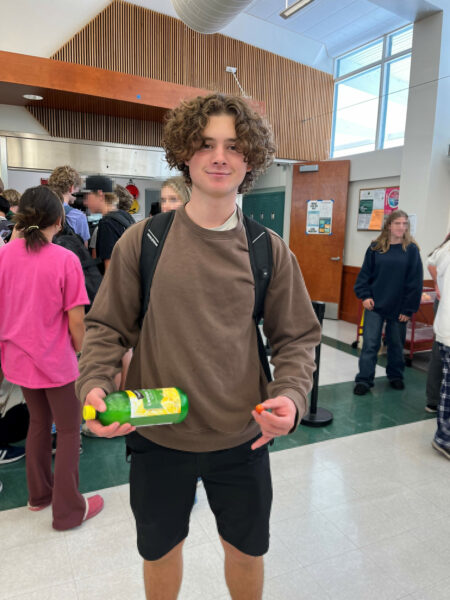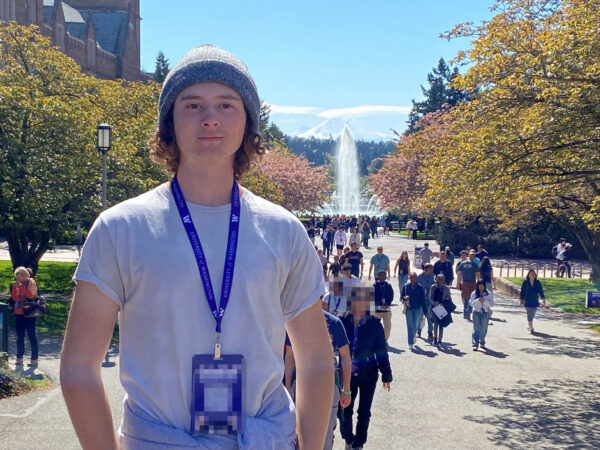From a diagnosis of profound hearing loss at birth, to becoming a high achiever, Michael has had a very impactful experience with cochlear implants in his life. The obstacles he has overcome and his access to the hearing world have motivated him to become part of the Cochlear Mentor Program, and help others with his firsthand experience. Read his story below:
“I just celebrated my 18th birthday. For 17 of those years, I’ve been able to hear thanks to my cochlear implants.
I was born with profound bilateral sensorineural hearing loss due to a connexin 26 genetic mutation. My parents were both carriers, but they didn’t know about it until I had genetic testing. I was born in Europe, where there was no universal hearing screening for newborns and my parents had to fight to get me tested because they knew something was off. I had my first implant surgery in Paris at the age of 11 and my second one in San Francisco at the age of 2.
My parents immediately decided to pursue an auditory-oral route in my upbringing and my speech and language skills quickly caught up with my peers. The surgeon in Paris recommended Cochlear because my parents knew we were going to move back to the United States and Cochlear had the widest international presence of all available manufacturers at the time.
 Overcoming challenges and becoming a high achiever
Overcoming challenges and becoming a high achiever
Thanks to my cochlear implants, I have been able to have the same opportunities as my peers. I have always attended mainstream public schools and I’m about to graduate high school having taken nine AP classes. I played the trumpet in my fourth and fifth grade jazz band. I grew up speaking French and English and I am currently enrolled in AP Spanish. Even though having prosthetic devices has its challenges, in a way I feel that I have the best of both worlds: I can choose to hear or not. When I wear my implants, the quality of the technology is such that I can fully function in the hearing world, and when I take them off to study or relax, I can fully focus or re-center.
Having access to the hearing world has allowed me to grow up like a typical teenager. I have played competitive soccer, football and basketball through and outside of school. I’ve been on my high school tennis team for four years. Like my peers I enjoy music and I particularly like the ability my phone has to connect to my implants through Bluetooth®2 allowing me to stream3 audio directly into my Cochlear™ Nucleus® 7 Sound Processors.
My parents told me how challenging it was for them when they found out I was deaf because they were either receiving a lot of conflicting advice, or no advice at all on how to manage my condition. For example, they were told to only speak one language to me, even though we are a bilingual family. Every time they moved and changed medical teams, they were told to adopt a different approach: cued speech when they lived in Paris; Total Communication, which is a combination of speech and ASL, when they moved to San Francisco, back to cued speech when they moved to Berkeley and auditory-oral when they moved to Oakland. They said it was like flying blind, and if they had had the opportunity to talk to a teen like me or a family that was ahead of us on this journey, it would have brought them so much relief.
 Mentorship & the ability to give back
Mentorship & the ability to give back
That’s what motivated me to become a Cochlear mentor, so that I can connect with families and children or teens who are considering cochlear implant surgery but don’t know what the future holds. I can show them firsthand what it’s like to grow up with cochlear implants and share with them how life-changing it has been, not just for me but for my entire family. Every opportunity to give back and support another family who’s embarking on this journey is transformative, and I’m grateful to the Cochlear Mentorship program for creating these opportunities for me.
As I prepare to go off to college, I know higher education will present new challenges. I have worked with my school counselors and county representatives to identify strategies and tools such as live captioning that may be available to me for lectures and classes. I look forward to bringing my unique perspective to my new community. Having cochlear implants hasn’t erased or cured my deafness, and being deaf remains a part of my identity, but having access to the hearing world has kept all the doors open for me.”
If you are experiencing hearing loss or been identified as a cochlear implant candidate, the Cochlear Mentor program can help. Check out this program today.
- In the United States, the Cochlear Nucleus 24 cochlear implant system is intended for use in children 9 months to 24 months of age who have bilateral profound sensorineural hearing loss and demonstrate limited benefit from appropriate bilateral hearing aids. Children 2 years of age or older may demonstrate severe to profound hearing loss bilaterally. In Canada, the Cochlear Nucleus Implant System (CI500 and CI600 Series) is intended for use in children 9 months to 24 months of age who have bilateral profound sensorineural hearing loss and demonstrate limited benefit from appropriate bilateral hearing aids. Children two years of age or older may demonstrate severe to profound hearing loss bilaterally.
- The Bluetooth® word mark and logos are registered trademarks owned by Bluetooth SIG, Inc. and any use of such marks by Cochlear is under license.
- For a full list of smartphone and app compatible devices, visit: www.cochlear.com/compatibility.